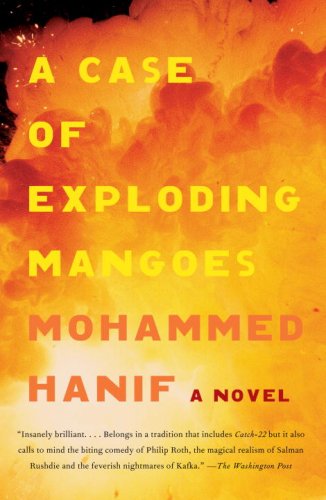All Nonfiction
- Bullying
- Books
- Academic
- Author Interviews
- Celebrity interviews
- College Articles
- College Essays
- Educator of the Year
- Heroes
- Interviews
- Memoir
- Personal Experience
- Sports
- Travel & Culture
All Opinions
- Bullying
- Current Events / Politics
- Discrimination
- Drugs / Alcohol / Smoking
- Entertainment / Celebrities
- Environment
- Love / Relationships
- Movies / Music / TV
- Pop Culture / Trends
- School / College
- Social Issues / Civics
- Spirituality / Religion
- Sports / Hobbies
All Hot Topics
- Bullying
- Community Service
- Environment
- Health
- Letters to the Editor
- Pride & Prejudice
- What Matters
- Back
Summer Guide
- Program Links
- Program Reviews
- Back
College Guide
- College Links
- College Reviews
- College Essays
- College Articles
- Back
The Case of The Exploding Mangoes by Muhammad Hanif
Muhammad Hanif’s first novel is provocative, exuberant, wickedly clever and satirical that reimagines the conspiracies and coincidences leading to the mysterious 1988 plane crash that killed Pakistan’s dictator General Zia ul-Haq. Despite a shaky start, with overkill on the familiar imaginative topography of Pakistan - deserts, generals, spies, explosions and cover-ups, Hanif's narrative deftly explores the various possibilities suggested by Zia's death in a mysterious 1988 plane crash. Along the way, there's plenty of humour and slapstick. Hanif actually served in the Pakistan Air Force, so his descriptions have a realism that is hard to match.
At the center is Ali Shigri: Pakistan Air Force pilot and Silent Drill Commander of Fury Squadron. His father, one of Zia’s colonels, committed suicide under suspicious circumstances. Ali is determined to understand what or who pushed his father to such desperation and to take revenge of his death.
What he quickly discovers is a snarl of events: Americans in Pakistan, Soviets in Afghanistan, dollars in every hand. But Ali remains patient, determined, a touch world-weary and unsurprised at finding Zia at every turn. He mounts an elaborate plot for revenge with an ever-changing crew that includes his silk-underwear-and- cologne-wearing roommate; a hash-smoking American lieutenant with questionable motives; the chief of Pakistan’s secret police, who mistakenly believes he’s in cahoots with the CIA; a blind woman imprisoned for fornication; Uncle Starchy, the squadron’s laundryman; and, not least of all, a mango-besotted crow. General Zia—devout Muslim and leering admirer of non-Muslim cleavage—begin every day by asking his chief of security: “Who’s trying to kill me?” and the answer lies in a conspiracy.
The story has a very strong but dark comical side to it , it is shown in how Zia-Ul-Haq is depicted as a buffoon who tries to use the Quran as a fortune telling tool, whose wife mercilessly mocks him, and whose subordinates are flabbergasted by his backwardness. Pakistan is depicted as a very strange place -a place where a blind women is arrested for being raped, and where the rulers are surprised that the Western world is appalled at this. Osama bin Laden shows up as the guest and also a hero of the Americans at a 4th of July party, and the Americans also come in for plenty of mockery. Shigri also gets arrested in a case of mistaken identity, and then made into a hero, in another case of mistaken identity.
In the end, what we get is a story about a few bad men rather than a far-reaching and complicated political alliance whose global legacy shapes our lives. Perhaps "dictator novels" inevitably collude with us in evading reflections on human complicity. In Rushdie's words, "if it is just a question of King Kong and Godzilla wreaking havoc until the aero planes bring them down - then the rest of us are excused". Fed on a steady diet of cultural oppositions, we've become less resistant to syndicated morality tales than we might be. Perhaps we want some places to function as ciphers - blighted landscapes of fundamentalism, despotism, un-freedom, mirrors to our satisfied sense of self. Reality is messier: these are ordinary societies and human beings at the receiving end of brutal historical agendas. The most unexpected aspect of Mangoes is also its most compelling - the wryly told story of a love affair between two cadets. The incisive work that remains unwritten inside Hanif's promising novel can only emerge when we become more demanding readers of other places. In this case that would be a Pakistan not reducible to generals, jets and jihadis.
While recent years have seen an explosion of fiction from Indian authors being published in the West, the same can't be said for the other country that was born out of Partition; Pakistan. Pakistan remains something of a mystery for most people in North America, occasionally gaining notoriety for acts of violence against women, political assassinations, and insinuations about its ties with the Taliban and the insurgency in Afghanistan.
As a thriller, the novel has plenty of reassuringly familiar characters, such as the intelligence agent who "runs the world with a packet of Dunhills, a gold lighter and an unregistered car". Military aircraft stunts provide gizmo glamour (Hanif is a trained airforce pilot). In this account of his botched missions, Junior Officer Ali Shigri, would-be assassin, is a convincingly klutzy semi-hero. Cadet life is entertainingly evoked, overflowing with japes, jerk-offs, hashish highs and liquored lows.
The best part was the description of torture center at Lahore Fort. I secretly wish I was there. The character of that blind christian girl who was accused of blasphemy is relevant to the Rimsha Blasphemy Affair, a minor christian girl with down's syndrome accused of blasphemy.
The book is an intrigue and subterfuge combination with misstep and luck in this darkly comic book about love, betrayal, tyranny, family—and a world that unexpectedly resembles our own.
Similar Articles
JOIN THE DISCUSSION
This article has 0 comments.

